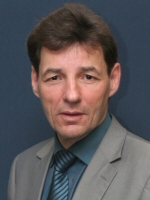


The chair, founded in 2004, has achieved international recognition under the label “Biegen in Siegen”. With our team we particularly work on topics relating to the bending of profiles and pipes.
In three working groups we rewritten our content with
The UTS conducts application-oriented research in order to, on the one hand, address current industrial issues in basic research and, on the other hand, to make industrial research usable. The close connection to industry is often the starting point for innovation and also the motivation for basic engineering research.
A central competence of our chair is process development in order to meet future requirements. In an era of change, particularly from mass production to mass personalization production in bending technology, we recognize the need for a paradigm shift. The dissolution of tools, the mastery of the bending process and the digital linking from the semi-finished product to the forming machine are methodically developed and tested in an industrial laboratory environment.
Our goal is to promote scalable manufacturing systems that allow for variation in geometry, material and semi-finished product geometry in their configuration. In this context, we emphasize networked production and flexible processes supported by functionally expanded tools. This development not only enables greater individualization of the products, but also plays a decisive role in questions of machine setup and the integration of the customer into the process.
Teaching, especially the topics in study, bachelor’s and master’s theses, are usually closely related to the current research priorities and development projects.


The chair, founded in 2004, has achieved international recognition under the label “Biegen in Siegen”. With our team we particularly work on topics relating to the bending of profiles and pipes.
In three working groups we rewritten our content with
The UTS conducts application-oriented research in order to, on the one hand, address current industrial issues in basic research and, on the other hand, to make industrial research usable. The close connection to industry is often the starting point for innovation and also the motivation for basic engineering research.
A central competence of our chair is process development in order to meet future requirements. In an era of change, particularly from mass production to mass personalization production in bending technology, we recognize the need for a paradigm shift. The dissolution of tools, the mastery of the bending process and the digital linking from the semi-finished product to the forming machine are methodically developed and tested in an industrial laboratory environment.
Our goal is to promote scalable manufacturing systems that allow for variation in geometry, material and semi-finished product geometry in their configuration. In this context, we emphasize networked production and flexible processes supported by functionally expanded tools. This development not only enables greater individualization of the products, but also plays a decisive role in questions of machine setup and the integration of the customer into the process.
Teaching, especially the topics in study, bachelor’s and master’s theses, are usually closely related to the current research priorities and development projects.